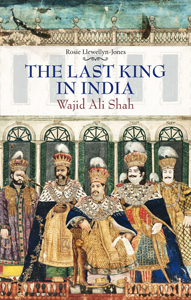Biographies of historical figures stitched together using the material available with a bit of imagination acting as a thread can be very interesting – as they leave some gaps open to interpretation for the reader. As you read you add the bits you know about the figure. Mostly what you have heard about them from popular perception. Or read in school textbooks. It can be a heady mix of known facts and myths and the legends surrounding the figure. I expected that a lot in The Last King in India – Wajid Ali Shah’s biography by Rosie Llewellyn-Jones – for he comes from an era that was well documented and he was the last of his kind.
Rosie writes primarily from the British accounts of Wajid Ali Shah. The book starts with not so great a note. I was lost in names and dates by the second chapter. There were just too many of them and the king himself was literally absent from these chapters. Meaning around 30% of the book. A detailed account of his mother’s journey to England, her and many other family member’s death there may have been relevant.
What, I could not get is how the catering company’s details that served the meals when she briefly met the queen relevant? It may be relevant when you are writing the catering company or its owner’s biography. But in a King’s biography – who was not even there during the meal? There are many such irrelevant recorded facts in the book. They have no relevance to the story of the king’s story. Too many names and dates – relevant for a research student probably, but the book can be confusing for the general reader.
From the 3rd chapter, the book picks up and then it becomes interesting. I particularly loved the chapters on King’s wives – 375 in number. Especially their hierarchy in the system. The concept of ‘Nikah wife’ or legally wedded wife. The Mutah or contract wives of two varieties – one who bear king’s children and the ones who do not – each of them had different rights to the king and his property. Each of them was salaried wife in a way.
Mutah wives stayed married for a limited period. Rosie Llewellyn-Jones says that this is as per the Sharia law. I am keen to understand this system from a Sharia follower – and wonder if this was a special provision for the king? Does it apply to anyone who follows Sharia? The complications that these marriages and their offsprings lead to when the king loses his kingdom sounds hilarious for the reader. It is definitely amusing for the author. But from what she writes, it seems the king was pretty ok with it. He was very comfortable with this whole situation. He also did not feel any responsibility towards his large extended family and continues to marry more and more women.
Another chapter that talks about the animals the king had in his in-exile residence in Calcutta are an eye-opener. We know about the animal love of many kings and their fondness for hunting, but this is crazy. Having a Menagerie when you are living on a pension and that too having dangerous animals live with your own children and not to talk about spending a fortune on them. Since it is primarily a British account of Wajid Ali Shah’s life post he came in touch with them – you see them underestimating his lifetime for almost 30 years.
All those years they kept giving in to his demands. Thinking, after all, given his health, he is not going to live too long. It seems after all the king had the last laugh. He comes across as a man who lived in his own world.He refused to give up being a king – at least not within the confines of his small kingdom that he had created at Garden Reach in Calcutta.
I would have liked at least a chapter on his poetry, for that is what we Indians remember him the most for. I also wanted more insights on him as a person as well as, a king. But what you gather from this book The Last King in India is everything that was happening around him. Especially in the days, he spent in Calcutta. There is virtually nothing about his growing up days. At the same time, I do understand the limited material that might be available for that aspect.
You might find The Last King in India interesting, in parts, if British Era history excites you.
You may buy this book – The Last King in India – Wajid Ali Shah by Rosie Llewellyn-Jones at Amazon.










I am very interested in Wajid Ali Shah, especially his poetry. But this book seems to fail on these accounts 🙁
Maybe there is some other better book on him out there.
Nope, on poetry front this book does not anything at all. Whatever little translations are there – put him and his poetry in rather bad light.
Ohhh 🙁
Am intrigued by your review…And its an honest one as I too tend to get lost in the mayhem of manes and dates in historical novels… as you have reviewed , from the 3rd chapter the story seem to unfold ….
*names* … lolz ……….it suits manes……